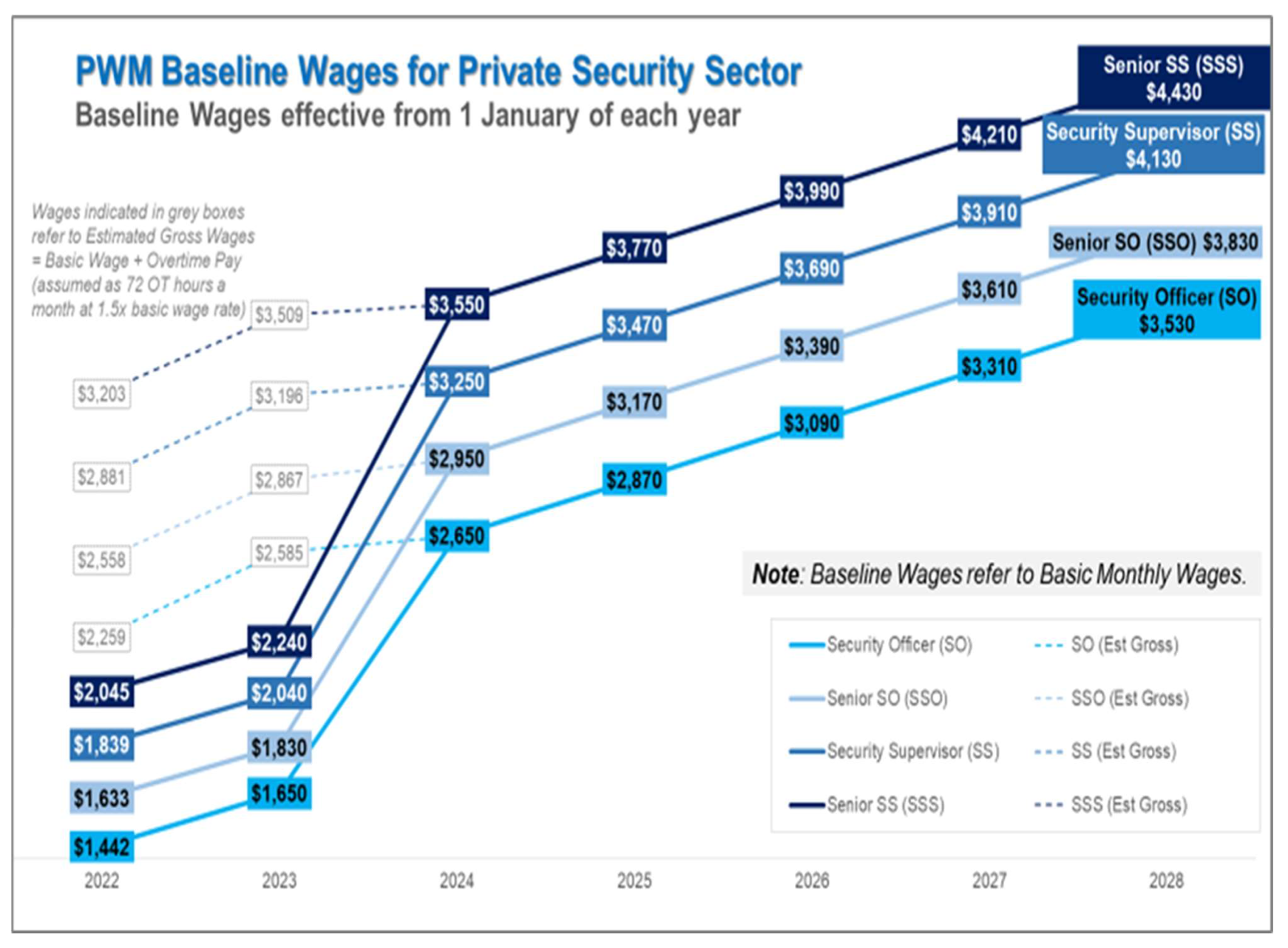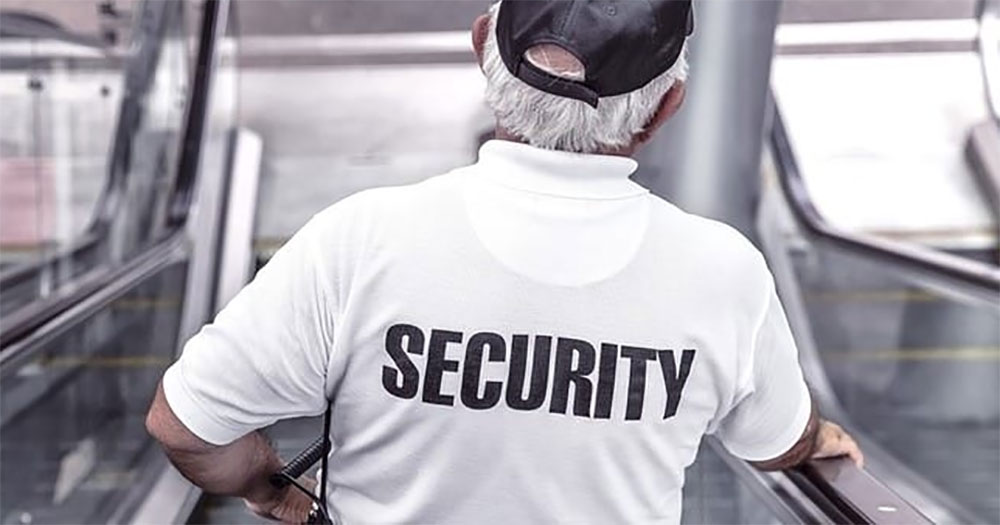Follow us on Telegram for the latest updates: https://t.me/mothershipsg
The government has accepted the Security Tripartite Cluster (STC)'s recommendations on its review of the Progressive Wage Model (PWM) for the private security industry.
One of the accepted recommendations is to progressively increase the basic wages of security staff to at least S$3,530 by 2028.
As of Oct. 1, the STC said, there are approximately 40,000 resident — that is, either Singapore citizen or permanent resident — security officers, who are employed by 265 security agencies.
Raise wages from 2023 to 2028
On Friday (Nov. 12), the STC released its recommendations — including the proposal to raise the PWM baseline wages from 2023 to 2028 and cap extra working hours at 72 hours per month — which the government accepted.
Back in November 2017, the STC had recommended a six-year schedule of wage increases, which included minimum 3 per cent annual increments from Jan. 1, 2022 to Dec. 2024.
In its most recent recommendations, the STC stated that it has decided to keep to the 3 per cent increase it had proposed for 2022.
However, from 2023 until 2028, the baseline wages of resident security staff will increase progressively.
Beginning from 2024, the basic monthly wage of security staff, no matter their rank, will rise above the S$2,600 threshold for coverage under Part IV of the Employment Act, which provides basic protection on hours of work, rest days, and entitlement to overtime pay.
Under Part IV of the Employment Act, employers must pay workers at least 1.5 times the hourly basic rate of pay, and workers are allowed to work up to 72 overtime hours per month.
 via STC.
via STC.
For the lowest-ranked security officers, their basic monthly wages will go from S$1,442 in 2022 to S$1,650 in 2023.
Both of these wage levels do not include overtime pay; adding in 72 hours of overtime work at 1.5 times basic wage results in an estimate of S$2,259 and S$2,585, respectively, for 2022 and 2023.
The base wage will then jump to S$2,650 in 2024, progressively rising year after year until reaching S$3,530 in 2028. From 2024 to 2028, the basic wage will be inclusive of work done in addition to the 44-hour regular work week.
Thus, the monthly gross wage of Security Officers (lowest rank) will increase by more than 50 per cent from 2022 to 2028, the STC said in a Nov. 12 press release:
"Overall, the monthly gross wage across all job levels will increase by an average Compound Annual Growth Rate of 6.6 per cent from 2022 to 2028 – more than two times the minimum three per cent annual increase announced in November 2017."
Cap extra working hours at 72 hours per month
STC said that doing so will "assure security officers of sustainable wage growth without needing to clock excessive hours for a higher gross wage":
"By setting a basic wage of $2,650, security officers will be able to negotiate for better employment terms with their employers and focus on reducing their overall working hours."
As security officers will cross the S$2,600 monthly basic wage threshold for coverage under Part IV of the Employment Act by 2024, the STC proposed that extra working hours above the 44-hour workweek be capped at 72 hours per month.
This is "to continue to safeguard security officers' working hours and ensure they do not work excessive hours under the new wage schedule", and to "ensure all security officers are fit to discharge their duties in a professional and competent manner".
The STC said the move to raise the basic wage of security officers to S$2,650 is "necessary to drive industry transformation", but added that service providers should work closely with the Union of Security Employees, in order to ensure that employment contracts continue to be fair to security officers.
This includes ensuring that officers have adequate rest, and are not made to work more than 12 hours per day.
Need to attract new entrants into industry, to avoid manpower crunch
These fixed dollar quantum annual increment from 2025 to 2028 is to ensure sustainable wage increases and to attract new entrants to the industry, STC said.
The STC stated that while the supply of active security officers have steadily increased over the years, there continues to be a shortfall in manpower needed to meet the increasing demand for security services, due to new buildings being build and Covid-19 safe management measures.
"The shortage of manpower has been a perennial challenge faced by the security industry despite efforts to improve the wages and working conditions of the officers. It is imperative that the security industry optimise the use of security manpower."
The STC also added that it "notes the urgency to expedite the pace of industry transformation, increase the adoption of technology, and inject new blood into the workforce so that the security industry will not be confronted with a severe manpower crunch in the near future."
In a joint press release on Nov. 12, the Ministry of Home Affairs and Ministry of Manpower wrote:
"Overall, the STC’s recommendations are timely and will augment tripartite efforts to uplift lower-wage workers and transform the security industry.
Government agencies will work closely with tripartite partners to implement the recommendations and create more meaningful careers for security officers, increase productivity, and improve security outcomes in a sustainable manner."
The STC's full recommendations are available to read here.
Follow and listen to our podcast here
Top photo via Pixabay.
If you like what you read, follow us on Facebook, Instagram, Twitter and Telegram to get the latest updates.
